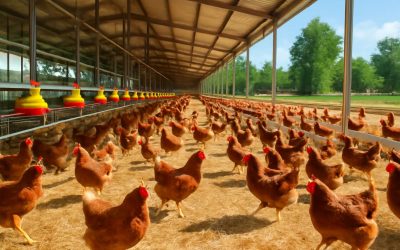
If you’re looking to raise chickens for eggs, you may be wondering what to expect when you start up. You’ll need to know how much time and money you’re willing to invest, as well as the specific needs of your chickens. But if you’re serious about your goal, you can start small and grow as you go.
Eggs are a source of many nutrients, including fat, water soluble vitamins (A, B12, riboflavin, etc.), and minerals like phosphorus, zinc, and iron. The type of diet your chickens eat and the way they are raised also affect their egg quality.
Unlike eggs from supermarkets, which have been through long processing processes to reach the supermarket shelf, fresh eggs are still raw and haven’t been treated with any chemicals or antibiotics. This means they’re much healthier for you and your family.
To produce eggs, you need to provide your birds with a complete and balanced diet that meets all their needs. This includes a variety of grains, vitamins, and minerals.
When choosing feed, make sure it contains a balanced amount of protein, calcium, phosphorus, and other vital nutrients. You can also add Vitamin D to your flock’s food, especially if you live in an area where sunlight is scarce.
It’s important to have non-acidic, clean water for your hens. This is especially important if you’re raising chickens who forage outdoors, since they might not be able to handle the salt in tap water.
As soon as your chicks are old enough to lay eggs, give them a layer diet that provides extra calcium and phosphorous, as well as other essential vitamins and minerals. You can also give them calcium-rich crushed oyster shells to help promote strong eggshells and a healthy laying egg.
If you don’t want to use commercially available feed, mix your own with scratch grains that you harvest from the ground. But be aware that your hens might develop nutrient deficiencies from this practice, so be sure to buy a high-quality feed.
Keep in mind that if you’re raising a large number of hens, the cost of producing eggs can become prohibitive. You might want to consider a commercially available feed supplement, such as one that has been proven to increase egg production and reduce nutrient loss.
Besides the costs of producing eggs, you’ll also need to spend on equipment and other supplies for your chickens. You can purchase these items from a local farm supply store or order them online.
You can also find poultry-specific supplements for your hens at the store. These often include omega-3 fatty acids from fish oil or chia seeds.
Your hens are likely to be pregnant at some point, so you’ll want to ensure that they are given plenty of space and access to good nutrition during their pregnancies. This is essential to ensure that their eggs are healthy and that they are not prone to developing disease later on.
Hens are prone to a condition known as molting, which is when they stop laying for a while during the winter. You can prevent this from happening by keeping your hens in the run during these months and providing them with extra light. This will stimulate their ovaries to lay during this time.



0 Comments